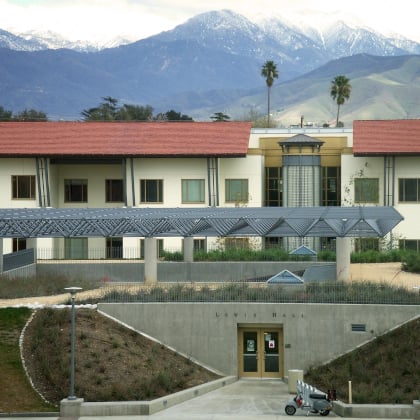Find us on campus

Lewis Hall

In the Environmental Studies program you will engage in a curriculum that includes the study of living systems, earth science, and environment-society relations, to examine the relationship between humans and the natural environment from a variety of perspectives.
Through small class sizes, the Environmental Studies program at Redlands will immerse you in conservation and sustainability challenges, combining outdoor activities with practical solutions. You will have the opportunity to participate in community-based environmental justice events like the Climate Teach-In, explore environments through camping trips or by studying aboard, work on the Sustainable University of Redlands Farm (SURF), and join student-led organizations like Students for Environmental Action (SEA). As a student in the program, you will be provided with a robust network of professionals and skills in various areas, have the opportunity for paid summer internships and research, and the option to pursue advanced degrees post-program completion.
To view specific classes, program requirements, and coursework information, visit the current university catalog.
Select 1 course from each of the following categories:
Please note, at least 3 courses must be selected from the Natural Sciences Electives list and at least 3 of the 4 must be taken within EVST. Courses toward Core may not be double counted to meet elective studies requirements.
The Environmental Studies minor offers you a strong understanding of the subject through 24 credits minimum in these environmental studies-related courses.
Introductory Course
EVST 100 Introduction to Environmental Studies (4), or equivalent
Select 1 course from the following categories:
Environmental Social Science
EVST 241 Environment & Society
EVST 220 Physical Geography (4)
EVST 290 Environmental Geology (4)
EVST 245 Marine Environmental Studies (4)
EVST 305 Ecology for Environmental Scientists (4)
Environmental Studies Elective: 1 Course
Choose from EVST courses numbered 200 and above
The Environmental Geographic Information Science (GIS) minor, strategically designed to equip majors in Environmental Studies with specialized GIS competencies, is specifically tailored to enhance your expertise in environmental applications and scientific inquiry.
Complete ALL of the following courses:
Complete at least 2 of the following courses:
* GIS 325 and GIS 326 or GIS 425 recommended
Complete at least 2 of the following courses:
* EVST 250 or EVST 350 recommended
Early Action 1: November 1
Early Action 2: December 1
Regular Decision: January 15*

Lewis Hall



As part of CORE Four: Redlands' Signature Experiences, May Term offers students to learn beyond the classroom. Among its popular courses is the Panama program—favored by environmental studies, geographic information sciences (GIS), and physics students, but open to all CAS students. Learn more about Professor Dan Klooster’s PanaMapping program, where Redlands students Ian and Keegan share their experience in the Panamanian rainforest.
Every Redlands faculty member is an active practitioner in their field. The classes they teach emerge from their unique research and practices, and they’re passionate about what they’re sharing.






Get in touch with our admissions team.